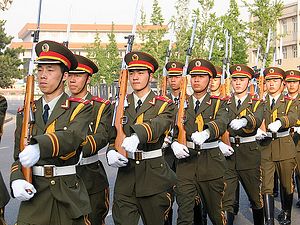How serious are China’s civil-military relations problems?
A recent essay that appeared in multiple outlets across China highlighted ongoing concern over this issue. A good supporting analysis from the blog “Politics from the Provinces” suggests that the wide dissemination of the essay indicates ongoing concern over the readiness of the force, the control of the Party over the Army, and the depth of corruption within China’s military organizations.
It was well understood that during the 1990s, the Chinese military had serious problems with internal corruption. Funding cuts, without accompanying reductions in personnel, created significant incentives for corruption on the part of officers; indeed, PLA formations created their own enterprises and acted more as economic firms than as military units. The implications for training and discipline are obvious, but since China has mainly managed to avoid armed conflict against a capable opponent, it did not pay a cost for reduced military effectiveness.
The above-board nature of these enterprises ended in the late 1990s, under the leadership of President Jiang Zemin. However, the PLA remained, by most accounts, well-connected at a number of levels with different economic enterprises. The government crackdown, such that it was, in some ways merely increased the incentives for corruption by moving the economic relationships underground.
Corruption among the officer corps is a serious problem both for civilian control of the military, and for military effectiveness. Regarding the latter, corruption can lead to poor quality control in maintenance and procurement, bad procurement decisions, and weak discipline. But the essay also highlights a fundamental problem associated with the relationship between the CCP and the PLA. The PLA has always been a creature of the Party, and senior members of the CCP have depended for their survival on the loyalty of particular factions of the Army. When officers can be bought, or depend on the success of their corrupt connections for their prosperity, the ties that bind the Army and the Party weaken.
There seems little doubt that both of these dynamics worry Beijing, especially as China’s threat environment (in part because of the PRC’s assertive foreign policy) grows more dangerous. For both internal and external reasons, the CCP needs to hold the reins of the PLA tightly; for the moment, resolving the problems that it created during the 1980s and 1990s is a central priority.

































